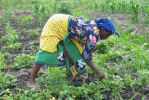Is the RBA's Deputy Governor Philip Lowe mixing his metaphors?

Speaking at an Australian Business Economist's dinner on 25 November, (http://www.abc.net.au/news/2014-11-26/rba-could-cut-rates-oecd-warns-of-housing-risks/5918946) the RBA's Deputy Governor Philip Lowe told the audience that Australians had gotten too accustomed to a world beating economy and seem to have become unduly depressed now that the nation has come back to the pack. He claimed that a factor boosting the economic outlook is population growth. Dr Lowe said it is much easier for domestic businesses to cope with uncertain economic times in the knowledge that "the overall size of the pie is getting bigger." The reality is that the pie per capita keeps getting smaller; so Philip seems somewhat confused.
 RBA Deputy Governor's "bigger pie" on a suburban building block?
RBA Deputy Governor's "bigger pie" on a suburban building block?
Let's compare this to the typical native settlement on the outer islands of Vanuatu. Let's say these natives have one hectare of land. They live a sustainable lifestyle with chickens, goats, coconuts, bananas and home grown vegetables much as they have for over a thousand years. No plastic, no debt.
Applying Dr Lowe's logic to the Vanuatu context, the more people living off that hectare of land the "bigger the pie" becomes. If we were to consult the natives, their prudent response would be that they can only support a limited number of natives on one hectare of land. That is how they had lived in relative harmony with their ecosystem for over a thousand years.

Is this an econo-moronic fantasy that assumes the more people you squeeze onto a hectare of land the "bigger the pie" becomes? Is this because economists think wealth is created by people alone, rather than by people harnessing resources from the environment that supports them? If one is in environmental denial, this would be a perfectly logical perspective. Is this why so many economists think carbon trading is an economic solution to an environmental problem? Do they think they can buy their way out of the problem?
If one is in environmental denial is one also in economic denial? For over a decade the Federal Budget has been growing at 6-8% per capita per annum while GDP has grown at less than 1% per capita per annum. The average growth of GDP per capita per annum has averaged 1.6% since Federation. So something is clearly very wrong and this is not just an aberration that can be explained as a consequence of the GFC.
The RBA has been performing a balancing act with interest rates for many years. One factor driving them up has been a desire to moderate the escalation of house prices and other demand related prices. But extreme population growth puts upward pressure on house prices as it creates demand in the economy. During the GFC the RBA kept interest rates higher than most countries while mass migration was ramped up as a strategy to avoid recession. In the immediate aftermath of the GFC there was a step change in Australian unemployment roughly equal to 25% of the number of migrants who entered Australia in the two years of Rudd's mass migration stimulus strategy. Was there a direct relationship between these two changes? Does the average migrant family comprise two parents and two children, with one working parent? If so, is this an example of correlation between a step change in migration and a step change in unemployment?
For many years the Australian dollar exchange rate has been very high. This has contributed to the destruction of Australia's manufacturing sector and to other adverse outcomes.
If we compare all this to the Vanuatu natives analogy, imagine making a decision to double the population on the one hectare settlement. There is no longer enough land to grow yams. Yams then become very valuable, a bit like house prices rising.
People become thinner and start to starve. They become weaker and cannot look after the animals and the vegetable plots. Crop yields reduce. Becoming thin in this way is a bit like going into debt that you cannot recover from, in conjunction with declining productivity.
The people are no longer able to help neighbouring villages by donating surplus food in times of need. This is a bit like Australia reducing foreign aid in the last two years by $7.5 billion and $4.5 billion.
This problem is not just about the insanity of endless population growth; it is about the rate of change, the speed of that growth. If you were to rapidly double the number of Kanakas [Kanaka was the term for a worker from various Pacific Islands such as the New Hebrides (now Vanuatu) employed in British colonies] on one hectare of land before they had worked out how to grow sufficient yams the Kanakas would be "knackered". This is exactly analogous to the scenario presided over by the RBA and its economic cognoscenti.
Even if endless population growth was feasible, there would have to be a coherent plan for enabling that growth. By continuing with extreme population growth without a coherent plan, Government and all its Agencies demonstrate their collective incompetence. They need to step back and orchestrate open public policy debate on behalf of the people.
Is there something the Deputy Governor of the RBA can learn about the difference between "pies getting bigger" and "pies getting smaller" and what this really means for humanity and the environment which supports it?
This, of course, does not mean plotting a course back to subsistence agriculture. But Australia's role as world leader in extreme-population-growth-driven unsustainable development is clearly in need of a sanity check. That sanity check requires open public policy debate; not suppression and denial supported by irrational rhetoric.

Recent comments